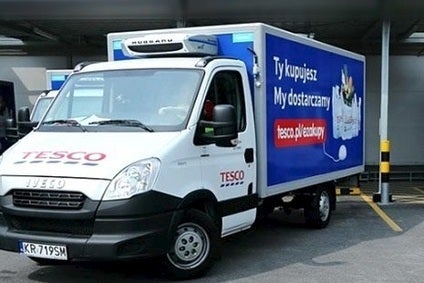
Western Europe has been at the forefront of the development of online food retailing but the channel has taken root further east – notably in Poland, with the country seen as having the most advanced grocery e-commerce sector in central and eastern Europe.
The market is still relatively small as food has been seen as one of the products Poles least like to buy online. According to Euromonitor, sales of packaged food online hit US$53.5m in 2014. However, online grocery is expanding, growing over 14% last year. Grocery products account for 10-15% of total e-commerce sales, data from local consultancy PMR shows.

Discover B2B Marketing That Performs
Combine business intelligence and editorial excellence to reach engaged professionals across 36 leading media platforms.
Many of the largest grocers in Poland have developed an online presence, notably Tesco, France’s Auchan and E. Leclerc, plus local retailers like delicatessen chain Alma, supermarket retailer Piotr I Pawel and online player frisco.pl.
However, there are some notable absentees, with Biedronka – the Polish market leader owned by Portugal’s Jeronimo Martins – and Carrefour not yet entering the fray.
“Biedronka does not plan to launch a grocery e-commerce offering in the near future. Similarly, Carrefour, which in Poland has developed a multi-channel portfolio of hypermarkets, supermarkets and convenience stores, does not have any plans to launch into grocery e-commerce in 2015,” Milos Ryba, senior international retail analyst for UK-based grocery analysis firm IGD, tells just-food.
Jaroslaw Frontczak, an analyst at central and eastern European consultants PMR Consulting, says Carrefour has a limited presence in online retail through non-food and through last year’s acquisition of north-eastern supermarket chain Rast but does not operate grocery e-commerce under its namesake banner. He believes the French giant could make a more significant move.

US Tariffs are shifting - will you react or anticipate?
Don’t let policy changes catch you off guard. Stay proactive with real-time data and expert analysis.
By GlobalData“Carrefour sells some of its products (e.g. white goods) through [online auction website] Allegro, however it is done only from one of its stores. It also bought the local Rast supermarket chain, which runs a local e-store. So in general it has some experience as to the e-commerce,” Frontczak says. “However, Carrefour has no official e-store. One of the reasons may be the high investment and currently Carrefour is rather focusing on franchise chains.”
The hefty investment could also be holding back Biedronka, Frontczak argues, and he also points to the discounter’s limited range.
“It would be a very big investment for Biedronka to run an e-store. Furthermore, it has quite a narrow offer compared with other stores. However, Biedronka could change the landscape with its e-store due to its wide expansion – so the e-store could offer the full variety of products in places where there is no other competition. In my opinion the problem lies in logistics as well as very high investment.”
Neither Biedronka owner Jeronimo Martins nor Carrefour responded to requests for comment. However, with online shopping growing in Poland, retailers not in the sector may start to see some impact on their market share.
Pointing to data for 2013, Frontczak says deli chain Alma was the online market leader but says Tesco, which started its online operations in 2012, has become the leading broader retailer in the channel.
“When the e-grocery channel was starting, the leaders come from either independent e-stores from Warsaw or delicatessen chains. Delicatessen chains were those that had a lot of customers that had money but not time, as well as an access to modern technology and the fact making an order was easy for them. That is why Alma become the leader of the whole of e-grocery,” Frontczak explains. “However, Tesco’s wide and fast expansion has allowed this brand to become a new leader. It was the matter of investment, wide offer as well as wider accessibility.”
The UK retailer, which has over 450 stores in Poland, says it delivers to 19 regions in the country from 26 hypermarkets, all of which have a click-and-collect service.
Tesco is coy about how its Tesco Ezakupy website and wider online service stacks up against competitors but industry watchers believe it has at the forefront of the development of the channel. “Tesco has the most developed e-commerce strategy and geographical coverage in Poland, offering home delivery to almost 30% of the population,” Ryba says. “It took this a step further last year when it launched an application allowing shoppers to make online orders from their mobiles.”
The launch of the app seems a wise move. Frontczak says smartphones can be used to place orders without apps but the initiative will, Tesco hopes, make its service even more convenient for Polish consumers. Frontczak says PMR does not have specific data on mobile commerce in Poland but adds: “In general, the m-commerce is growing even faster that total e-commerce market. It is still a small area but there are more smartphones on the market.”
Mobile technology could be an area from branded manufacturers to explore as they weigh up how to harness the growth of the online channel in Poland. Brand-owners have developed some ways of tapping into the growth of online grocery. Tesco says suppliers in the country use hyperlinks on their own websites that lead directly to their products on the retailer’s site. They also advertise on ezakupy.tesco.pl. Tesco’s app could be a further mechanism through which to use targeted campaigns to reach shoppers.
According to PMR data, the online channel is still a tiny proporition of total grocery sales in Poland. The consultants estimate it accounts for just 0.24% of sales.
However, industry watchers believe the channel is set for continued solid growth in Poland. “The internet channel generates only 0.24% of the total grocery market but the e-grocery market is forecast to grow by more than 20% year-on-year at least till the end of the decade – so the outlook is very promising,” Frontczak says.





